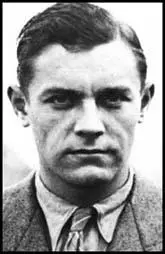Harry Peulevé

Harry Peulevé, the son of a French father and an English mother, was born in Worthing, Sussex on 27th January, 1916. He was educated in England and after attending Rye Grammar School studied electrical engineering in London. After graduating he was employed as a BBC cameraman at Alexander Palace.
On the outbreak of the Second World War there were only 7,000 people in Britain with television sets and so Alexander Palace was closed down. Peulevé then joined the British Army and was commissioned and sent to the recently formed Royal Electrical and Mechanical Engineers.
Peulevé's excellent French resulted in him being recruited by the Special Operations Executive (SOE). While being trained to work as a special agent in France he met and befriended Violette Szabo.
On 30th July 1942, Peulevé and Claude de Baissac, were taken aboard a Halifax bomber and parachuted into France. Unfortunately they were dropped too low over Nimes and both men were badly injured. Peulevé had a broken leg and the French Resistance now had the problem of getting him back to England.
After Peulevé recovered Maurice Buckmaster arranged for him and Nicholas Bodington to be dropped in France on 15th August, 1943. Peulevé went to Correze where he worked with the Frances-Tireurs Partisans and sent regular messages back to the Special Operations Executive in London. The average active life of a radio operator in France was only six months and it was no surprise when Peulevé was arrested in August 1944.
While being interrogated by the Gestapo Peulevé was temporarily reunited with Violette Szabo. They were separated when Peulevé was sent to Buchenwald concentration camp. Of the 43 SOE agents sent to this camp, Peulevé was one of only seven who were still alive when it was liberated in April 1945.
After the war Peulevé worked the Shell Oil Company. This was followed by the post of overseas manager of Handy Angles. Harry Peulevé died of a heart-attack on 18th March 1963.

